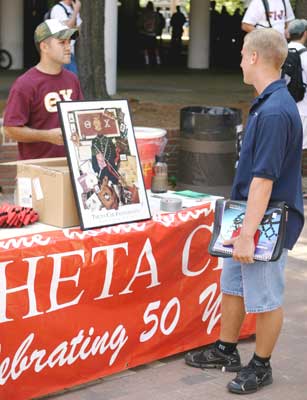Greek fraternities and sororities pile into the Brickyard, crying out to passers-by, looking for new members. The recruitment by the Interfraternity Council is at its height in the early weeks of school, as groups push for membership.
The fraternities and sororities are broken down into groups, such as social fraternities, with members such as Cory Gooden of Chi Psi.
“We are always known as a hard-working, diverse group of guys that seem different from the other groups on campus,” Gooden, a senior in paper management and environmental science, said.
Monday, students were encouraged to find out more information about the social male fraternities, in the IFC’s “Meet the Fraternities” program in the Brickyard.
For women, The Panhellenic Association is the umbrella under which the social female sororities sit.
“Each woman is required to perform at least 12 hours of community service per semester,” Andrea Atwell, the N.C. State’s Panhellenic president and senior in political science, said.
The National Panhellenic Council (NPHC) is historically African-American. These organizations have to exist on campus for 15 years before they can apply to become a part of the NPHC.
“The NPHC requires sophomore standing, so that members can establish themselves on campus, and also be involved in something else. They also must have a good GPA,” Ashley Canty, a national Panhellenic Council member and a senior in biological sciences.
Some of the anxieties that prospective members have, according to Greek Life leaders, are about money, initiation, hazing and whether or not it is really worth it to join a fraternity or sorority.
According to the Greek Life Web site the average cost to join a Panhellenic Sorority is $904.41 for the first semester and $732.16 for each following semester.
“One organization reflects your year in school: College Freshman $425.00, College Sophomore $390.00, College Junior $355.00, College Senior $320.00. Another group offers one flat fee regardless of year and is $700.00,” according to the Web site.
Atwell said the problem of hazing isn’t as prevalent as many might think.
“We have a strict no-hazing policy. Our initiations are secretive, but do not endanger or harm physically or emotionally. The myths where the sisters circle the fat on the rushee’s body are false,” Atwell said.
Eric Rieger, a senior in business management and an inactive member of TKE, said older fraternity members help new students with the little things that college presents.
“The older guys helped us out with school, and managing our time, and for those that were less social, it helped them gain confidence,” Rieger said. “In the beginning, I didn’t think I would join, but it was a smaller fraternity of thirty guys, I really liked the idea that a bunch of guys could pool their resources. It seemed to me a good first thing to try.”
John Mountz, the director of Greek Life, encourages early Greek Life participation as a way of getting involved and forming close relationships.
“The best thing about joining a greek organization is it helps establish yourself in a smaller network of people, it helps incoming students feel more at home because they are connected in a meaningful way. We find that these students are more likely to stay and do well,” Mountz said.








